The Young Deadly Syphilis Free Campaign
Young Deadly Syphilis Free is a multi-strategy STI awareness-raising campaign, developed in response to the ongoing syphilis outbreak affecting regional and remote Aboriginal and Torres Strait Islander communities in:
- northern and western Queensland, including Torres Strait Islands
- the Northern Territory
- the Kimberley region of Western Australia
- the Far North and Western regions of South Australia.
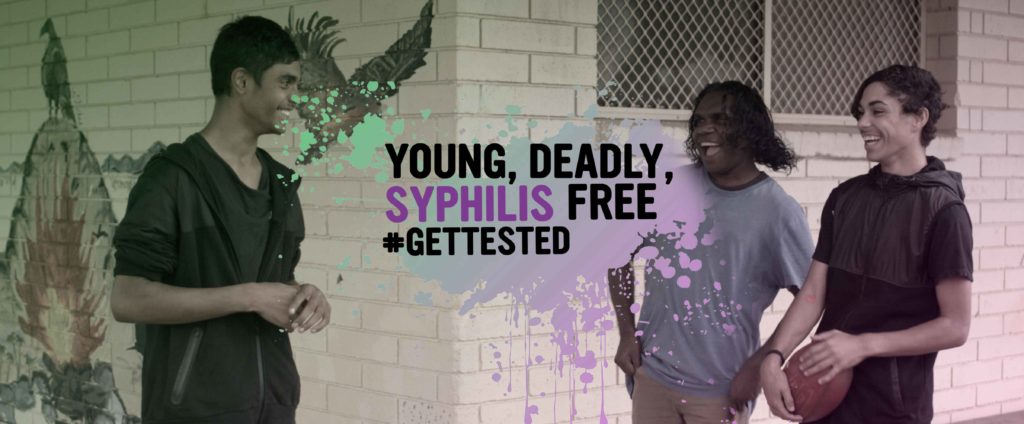
The campaign was developed by the South Australian Health and Medical Research Institute (SAHMRI), in consultation with the Multijurisdictional Syphilis Outbreak Group of the Communicable Diseases Network Australia.
Now in its third phase, the campaign is funded by the Australian Government Department of Health (funded to 30 June 2021).
Campaign Aims
The campaign’s focus is on encouraging Aboriginal and Torres Strait Islander young people to test for syphilis and other STIs to assist in bringing the outbreak under control. The campaign is targeted to young people, aged 15 to 34, who live in regional and remote areas of Queensland, Northern Territory, South Australia and Western Australia.
TV and Radio Ads
Phase 3 of the Young Deadly Syphilis Free campaign was launched in September 2019, with broadcasting of TV and radio ads in syphilis outbreak areas across Queensland, the Northern Territory, Western Australia and South Australia. These ads, which will continue to be broadcast throughout phase 3 of the campaign, seek to raise community awareness of the ongoing outbreak and the importance of regular testing, including in pregnancy. The original ads developed for phases 1 and 2 of the campaign are still being broadcast, along with new ads – including new animations.
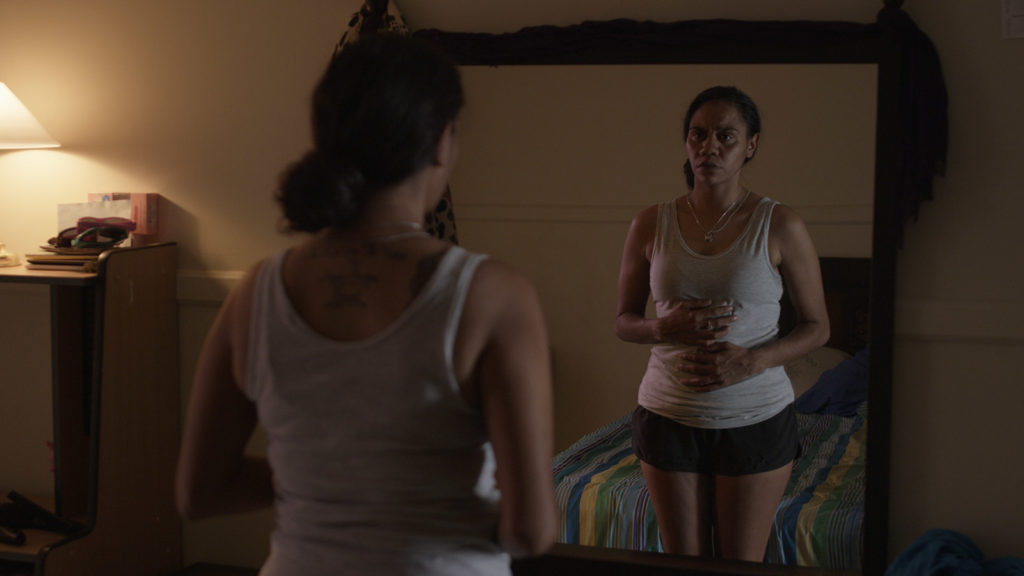
A selection of the TV and radio ads has been translated into community languages. The TV and radio ads can be accessed here.
Social Media
Social media is integral to the campaign, with social media platforms used as information hubs for young people to learn about and discuss STIs and testing, in the context of the campaign.
The campaign engages directly with young people in each of the campaign zones — via Facebook, Instagram and instant messaging sites such as Diva Chat. Posts include news of the campaign and its progress at local levels, using the most popular websites and social media in each zone.

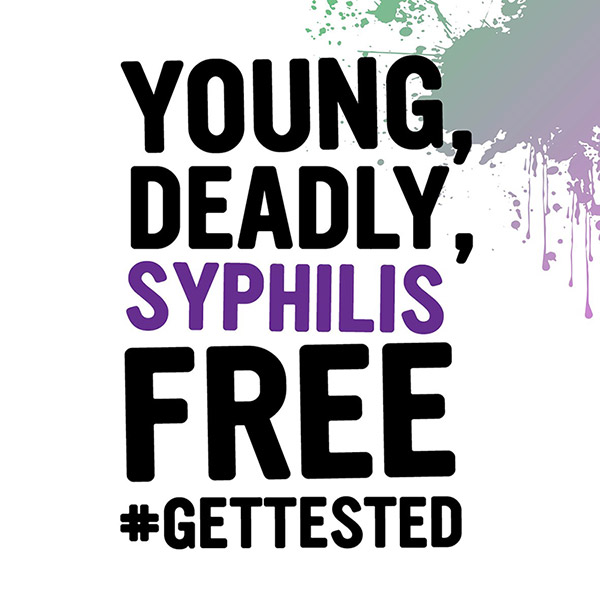
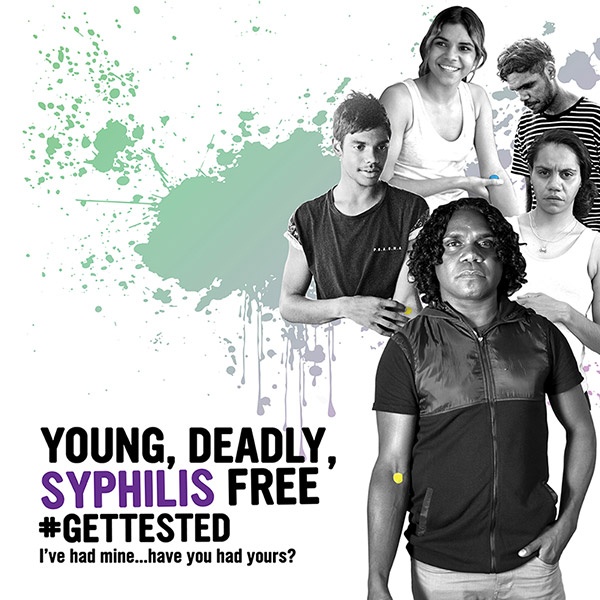
We are working with Diva Chat to promote the Young Deadly Syphilis Free campaign. Diva Chat is one of the most popular instant messaging chat services for young people living in remote Aboriginal communities and data has shown that this is a common place for young people in remote communities to meet each other.
E-newsletters provide regular updates to key influencers in each of their regions on campaign milestones (such as launch events, TV ads, Q&A chat), so that they can support the delivery of key campaign messages.
Clinical Support
An important component of the campaign is ensuring that clinicians working with young people in remote health services are supported.
Clinicians who are new to working in remote and very remote communities can find the context challenging, and be unsure of cultural sensitivities. We’ve produced videos providing background on the STIs and blood borne viruses affecting remote communities. The videos include information on epidemiology, with experienced clinicians sharing insights into best practice in communicating with young people regarding STI and BBV risk behaviours, sex and sexuality issues, and tips on how to normalise sexual health checks. We’ve also produced a manual for clinicians working in remote communities — STI and BBV control in remote communities: Clinical practice and resource manual.
Project Partnerships and Collaborations
The Multijurisdictional Syphilis Outbreak Group was formed in 2015, in response to the ongoing outbreak of syphilis among Aboriginal and Torres Strait Islander people living in areas of northern Australia. The Group has been integral in guiding development of the syphilis campaign, providing advice on:
- epidemiology of the outbreak – notifications, target age, gender, location of notifications
- synergising the campaign with existing activities to address the outbreak
- maximising engagement of primary health care services
- drawing on health services’ capability and capacity
- medical, clinical and other technical aspects of syphilis testing, treatment and management
- draft campaign components
- framing campaign objectives and vision.
Aboriginal Community Controlled Health Organisations have been involved in all aspects of the campaign development and rollout, including focus testing of the campaign name, messaging and content to ensure messaging and wording is appropriate for different communities. Focus testing was conducted in partnership with ANTHYM – Aboriginal Nations Torres Strait Islander HIV Youth Mob. 100 people from Aboriginal and Torres Strait Islander communities in the Kimberley, Northern Territory and Queensland participated in the focus testing.
Aboriginal Community Controlled Health Organisations are integral to rollout of the campaign, maximising community engagement by working with community partners in remote communities, such as youth organisations and Aboriginal community councils.
Aboriginal health services are being encouraged to promote STI testing at every opportunity – including adult health check days, adolescent health days and as part of antenatal testing. SAHMRI is working with participating Aboriginal health services as well as other primary health services to provide outreach activities to profile the Young Deadly Syphilis Free campaign in efforts to encourage young people to test for syphilis and other STIs, and to upscale the use of syphilis point of care tests (on-site rapid tests).
Campaign Coordination
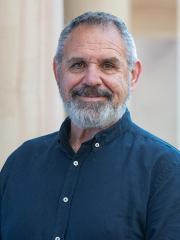
The Young Deadly Syphilis Free campaign project is led by Professor James Ward — Director, UQ Poche Centre for Indigenous Health / Professor, School of Public Health, University of Queensland.
Young Deadly Free is a project by the University of Queensland Poche Centre for Indigenous Health (formerly the South Australian Health and Medical Research Institute). © UQ POCHE 2024